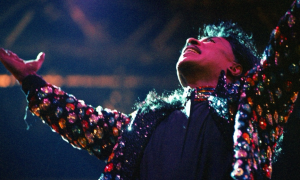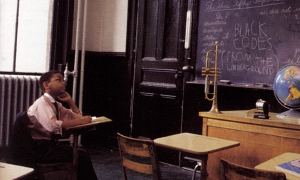Home » Jazz Articles » Opinion » Secret Jazz: The Swinging Side of Western Swing
Secret Jazz: The Swinging Side of Western Swing
...A bastard child that neither ountry nor jazz is willing to accept into their own house.
—Cary Ginell
 Western Swing is a musical genre wonderfully described by its leading historian Cary Ginell as "a bastard child that neither country nor jazz is willing to accept into their own house. In my opinion they are an important part of both genres." Jazz historian Ted Gioia in this thoughtful The History of Jazz, while also omitting any mention of Western Swing, does address a key reason for its neglect among jazz listeners:
Western Swing is a musical genre wonderfully described by its leading historian Cary Ginell as "a bastard child that neither country nor jazz is willing to accept into their own house. In my opinion they are an important part of both genres." Jazz historian Ted Gioia in this thoughtful The History of Jazz, while also omitting any mention of Western Swing, does address a key reason for its neglect among jazz listeners: For example, most chronicles of musical activity in the 1920s will draw an implicit delineation between popular music, jazz, and classical composition. Hence, accounts of jazz tend to present a polarized landscape in which hot bands (Henderson, Ellington, Goodman, Basie) thrive, develop, and change in complete isolation from other musical currents. Such categorizations may make the narrative structure of a music history book flow more smoothly, but much is lost in the process.
Strange to tell, I heard an album of Bob Wills and the Texas Playboys, the best known Western Swing band of all time, the same year I first heard a Coltrane album. Who I was many decades ago could not have allowed myself to conceive of Bob Wills and John Coltrane as belonging to the same musical universe. True, I heard Wills as a creator of eccentric mutation of big band swing, but the steel guitar and fiddles? And, oh, they looked so Texan redneck on the album photo, so unhip.
Age brings with it an appreciation of musical hybrids, those defined out by academic music histories as well as those predicated on reverse-racist stereotypes. 'The pure products of America go crazy,' wrote the esteemed poet William Carlos Williams, and if America has produced 'pure' musical products unique to its national identity, Western Swing must be counted among them. Part of its purity of form is its wholehearted embrace of jazz.
The simplest way to define the genre is to identify it as a style evolving from a hybridization of black and white Southwestern string band styles encompassing a broad variety of jazz, blues, and country music characteristics. Strings bands began in several parts of the country with fiddlers and guitarists performing a variety of old folk, blues, and minstrel tunes. When Milton Brown and his Musical Brownies, the subject of the only authoritative book on Western Swing, written by Cary Ginell, added a piano and Brown's crooning voice (think early Bing Crosby) to the string band format, Western Swing emerged. And there was one other unlikely jazz flavor instrumentally Brown added: the steel string guitar of Bob Dunn. Dunn, as unlikely as it would seem for a steel guitarist circa 1935, had as his musical idol the great jazz trombonist Jack Teagarden. So he improvised on steel guitar with Teagarden's trombone sound in mind. And less we neglect the piano man, Fred 'Papa' Calhoun certainly performed with a sophisticated awareness of Jelly Roll Morton and Earl Hines.
You can hear the results on a variety of multi-disc compilations from the Origin Jazz Library label and the U.K. budget label Proper, but for those wanting the jazzier side of Milton Brown and his Musical Brownies, I strongly advise trying the single disc compilation, Western Swing Chronicles Volume 1: Milton Brown and his Musical Brownies (Origin Jazz Library). The complete recorded works can be tough going for those who find vaudevillian humor and hillbilly antics a bit wearying in extended does. But Brown's stunning version of 'St. Louis Blues,' with a tension packed accelerating crescendo as unexpected as beguiling, makes enduring some of the sweetly sentimental country numbers on this single disc very tolerable. The hard swinging instrumental improvisations on piano and steel guitar and the simply crazed, Cab Calloway-like scat vocals on the up tempo jazzy numbers like 'Some of these Days' and 'Washington & Lee Swing' are timeless gems of 30s jazz. Painstaking remastering along with well-written liner notes make this an extraordinary package for a Western Swing novice.
Brown's tragic death in an auto accident led to the band's demise in the late 30s, but soon after Bob Wills and his Texas Playboys brought their own focus to Western Swing. Fiddler Wills, recording alongside of Brown in The Light Crust Doughboys, added to Brown's formula by adding a substantial horn section and adding vocalist Tommy Duncan, a singer with a freer rhythmic sense than Brown. Wills and Brown would often engage in a silly patter interrupting song lyrics with asides a la Fats Waller. The jazzier side of Bob Wills is easily found on any of the nine volumes comprising The Tiffany Transcriptions, radio studio recordings of the late '40s on the Rhino label. Covers of big band standards by Basie and Glenn Miller pop out from several discs, but the highpoint might be the jaw-dropping, good-humored cover of the Ellington-Strayhorn masterpiece, 'Take the A Train' on Volume Three that gallops along like a Texas appaloosa goofy on peyote.
Lest you think that all Western Swing simply borrowed stylistic elements of New Orleans and Big Band Swing, Hank Penny and his Radio Cowboys listened attentively to Charlie Parker and Dizzy Gillespie. Proof? Listen to 'Hillbilly Be-Bop' on Hank Penny: King of Hillbilly Bebop (Proper Records) for an ear-expanding experience. And moving further into progressive jazz: how about a takeoff of Stan Kenton on 'Artistry in Western Swing' by Tex Williams and his Western Caravan, included on Rhino's excellent single disc compilation, Heroes of Country Music Volume One: Legends of Western Swing. Also showcased on that compilation is the pianist Knocky Parker who established his jazz chops through recording the complete piano solos of Jelly Roll Morton before getting his PhD in English and becoming an English professor in Florida where he retired from all swinging activities related to music. More of Parker's jazz talents are found on the fine English import label ASV/Living Era CD, Western Swing: Hot Hillbilly Jazz & Blues 1935-1947. For any Western Swing novice on a budget, but with a deep hankering for a superbly sequenced overview of the style, there is the four disc box on the Proper label, Doughboys, Playboys, and Cowboys: the Golden Years of Western Swing.
All of this suggested listening involves going to your favorite music store and veering away from where jazz CDs are displayed. It may feel a bit odd to rub shoulders with the Dolly Parton set, but the rewards are stunning. Next time you hear about 'the West Coast' jazz style, think of the wild West style as a neglected forerunner. More stars shine bright in the heart of Texas than you may have ever realized.
Related Websites:
Proper Music and Origin Jazz
< Previous
Jazz to the Max: 4 New Releases From ...
Next >
Sunny Murray
Comments
Tags
For the Love of Jazz
 All About Jazz has been a pillar of jazz since 1995, championing it as an art form and, more importantly, supporting the musicians who create it. Our enduring commitment has made "AAJ" one of the most culturally important websites of its kind, read by hundreds of thousands of fans, musicians and industry figures every month.
All About Jazz has been a pillar of jazz since 1995, championing it as an art form and, more importantly, supporting the musicians who create it. Our enduring commitment has made "AAJ" one of the most culturally important websites of its kind, read by hundreds of thousands of fans, musicians and industry figures every month.




















